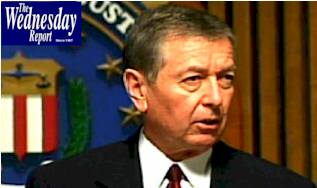

Volume 18, Number 22, May 26, 2004
New WW II Memorial Opens in "The Mall" - Washington DC
When organizers first proposed placing the National World War II Memorial on the National Mall, critics complained.
They said the memorial would spoil the ambience of the National Mall.
Proponents of the memorial countered that the site between the Lincoln Memorial and the Washington Monument emphasized the crucial role World War II has had in shaping the United States and the world. It's hard to argue with their logic.
The proponents won that argument, and the monument on the National Mall will be dedicated May 29.
The memorial honors the more than 16 million Americans who served during the war. It also recognizes the sacrifice of more than 400,000 U.S. soldiers, sailors, Marines, airmen, Coast Guardsmen and members of the Merchant Marine who died in that conflict.
World War II was the central facet of the 20th century. The war proved once and for all that democracies could stand up to totalitarian regimes. As with totalitarians before and since, Hitler and his Axis partners were wrong in their assessment of the United States.
The United States did unite during the war. Americans volunteered for service in the military. Millions swarmed production plants and churned out the tools of war. People endured rationing and collected scrap metal to build weapons.
It was total war, and the total population had to participate with unseen results.
Millions of women moved into the work force. "Rosie the Riveter" gave impetus to the push for women's rights.
World War II saw the rise of science. It changed the way Americans live. Radar came out of the labs to the battlefield. Instant coffee, Teflon, jet aircraft and rockets are just a few of the technologies that came out of World War II labs.
In a mixed blessing, labs also produced atomic weapons and atomic energy.
The war hastened the destruction of the colonial system in the world. In Asia and Africa, people saw the great empires humbled, and that encouraged their nationalist aspirations.
In the United States, a lasting effect of the war was the G.I. Bill. American service members came back from war and used this piece of legislation to get educations and buy homes. The middle class grew by leaps and bounds in the post-war years. Millions of Americans who had no chance before the war of attaining a college degree could get one. And that alone has changed the face of the United States.
Two superpowers emerged from World War II: the United States and the Union of Soviet Socialist Republics. That rivalry shaped the world through the early 1990s. In fact, some historians said the fall of the Soviet empire really signaled the end of the post-World War II era.
Before the war, Americans felt safe behind the moats of the Atlantic and Pacific. The United States did not need allies to defend Fortress America. After the war, Americans felt the moat had shrunk, and most realized that the United States had to remain a player on the world stage. Americans supported the United Nations and many other international organizations.
NBC news anchor Tom Brokaw has called those who fought in World War II "the Greatest Generation." Their memorial deserves its central place in Washington, because their sacrifices have been central to the world we have today.
Publisher and Editor In Chief:
Micheal John O'Brien
The Wednesday Report is published and printed weekly in hard copy by MPRM Group Limited
Telephone: {905} xxx-xxxx use email contact